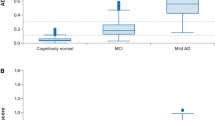Abstract
The Alzheimer’s Disease Assessment Scale (ADAS-Cog) has become the de facto gold-standard for assessing the efficacy of putative anti-dementia treatments. There has been an increasing interest in providing greater standardization, automation, and administration consistency to the scale. Recently, electronic versions of the ADAS-Cog (eADAS-Cog) have been utilized in clinical trials and demonstrated significant reductions in frequency of rater error as compared to paper. In order to establish validity of the electronic version (eADAS-Cog), 20 subjects who had received a diagnosis of probable Alzheimer’s disease (AD) at a private US Memory Clinic completed a single-center, randomized, counterbalanced, prospective trial comparing a version of the eADAS-Cog to the standard paper scale. Interclass Correlation Coefficient on total scores and Kappa analysis on domain scores yielded high agreement (0.88–0.99). Effects of order and mode of administration on ADAS-Cog total scores did not demonstrate a significant main effect. Overall, this study establishes adequate concurrent validity between the ADAS-Cog and eADAS-Cog among an adult population with diagnosed AD.

Similar content being viewed by others
References
Mohs RC. The Alzheimer’s Disease Assessment Scale: An instrument for assessing treatment efficacy. Psychopharmacology Bulletin 1983;19:448–50.
Rosen WG, Mohs RC, Davis KL. A new rating scale for Alzheimer’s disease. The American Journal of Psychiatry 1984. doi:https://doi.org/10.1176/ajp.141.11.1356.
Cano SJ, Posner HB, Moline ML, Hurt SW, Swartz J, Hsu T, et al. The ADAS-cog in Alzheimer’s disease clinical trials: Psychometric evaluation of the sum and its parts. Journal of Neurology, Neurosurgery & Psychiatry 2010;81:1363–8. doi:https://doi.org/10.1136/jnnp.2009.204008.
Doraiswamy PM, Bieber F, Kaiser L, Krishnan KR, Reuning-Scherer J, Gulanski B. The Alzheimer’s Disease Assessment Scale: Patterns and predictors of baseline cognitive performance in multicenter Alzheimer’s disease trials. Neurology 1997;48:1511–7. doi:https://doi.org/10.1212/WNL.48.6.1511.
Ferris SH, Lucca U, Mohs R, Dubois B, Wesnes K, Erzigkeit H, et al. Objective psychometric tests in clinical trials of dementia drugs: Position paper from the International Working Group on Harmonization of Dementia Drug Guidelines. Alzheimer Disease and Associated Disorders 1997;11:34–8.
Solomon TM, deBros GB, Budson AE, Mirkovic N, Murphy CA, Solomon PR. Correlational analysis of 5 commonly used measures of cognitive functioning and mental status: An update. American Journal of Alzheimer’s Disease & Other Dementias 2014;29:718–22. doi:https://doi.org/10.1177/1533317514534761.
O’Halloran James P, Kemp AS, Salmon DP, Tariot PN, Schneider LS. Psychometric comparison of standard and computerized administration of the Alzheimer’s Disease Assessment Scale — cognitive subscale (ADAS-cog). Current Alzheimer Research 2011;8:323–8. doi:https://doi.org/10.2174/156720511795563692.
Connor DJ, Sabbagh MN. Administration and scoring variance on the ADAS-cog. Journal of Alzheimer’s Disease 2008;15:461–4. doi:https://doi.org/10.3233/JAD-2008-15312.
Schatz P, Browndyke J. Applications of computer-based neuropsychological assessment. The Journal of head trauma rehabilitation. 2002 Oct 1;17(5):395–410. doi: https://doi.org/10.2174/156720511795563692
Wild K, Howieson D, Webbe F, Seelye A, Kaye J. Status of computerized cognitive testing in aging: a systematic review. Alzheimer’s & Dementia. 2008 Nov 1;4(6):428–37. doi:https://doi.org/10.1016/j.jalz.2008.07.003
Kane RL, Kay GG. Computerized assessment in neuropsychology: a review of tests and test batteries. Neuropsychology review. 1992 Mar 1;3(1):1–17.
Berg J-L, Durant J, Léger GC, Cummings JL, Nasreddine Z, Miller JB. Comparing the electronic and standard versions of the Montreal Cognitive Assessment in an outpatient memory disorders clinic: A validation study. Journal of Alzheimer’s Disease 2018;62:93–7. doi:https://doi.org/10.3233/JAD-170896.
Feaster HT, Solomon TM, Abi-Saab D, Vogt A, Barbone JM, Harrison J, et al. The impact of electronic clinical outcome assessments (eCOA) on Alzheimer’s disease clinical trial data quality 2017. doi:https://doi.org/10.1016/j.jalz.2017.06.1828.
Seichepine DR, Solomon TM, Jacobs EB, Barbone JM, DiGregorio DT, Miller DS. Comparison between flat and enhanced eCOA of MMSE Attention and Calculation in clinical trials of Alzheimer’s disease 2018. doi:https://doi.org/10.13140/RG.2.2.16193.61289.
Jack Jr CR, Albert MS, Knopman DS, McKhann GM, Sperling RA, Carrillo MC, et al. Introduction to the recommendations from the National Institute on Aging-Alzheimer’s Association workgroups on diagnostic guidelines for Alzheimer’s disease. Alzheimer’s & Dementia 2011;7:257–62. doi:https://doi.org/10.1016/j.jalz.2011.03.004.
Mohs RC. The Alzheimer’s disease assessment scale. International Psychogeriatrics 1996;8:195–203. doi:https://doi.org/10.1017/S1041610296002578.
Fuller RL, McNamara CW, Lenderking WR, Edgar C, Rylands A, Feaster T, et al. Establishing equivalence of electronic clinician-reported outcome measures. Therapeutic Innovation & Regulatory Science 2016;50:30–6. doi:https://doi.org/10.1177/2168479015618693.
R Core Team. R: A language and environment for statistical computing. Vienna, Austria: R Foundation for Statistical Computing; 2018.
Solomon TM, Karas SM, Barbone JM, DiGregorio DT, Miller DS, Feaster HT. Analysis of the rates and types of errors on enhanced eCOA versions of the Alzheimer’s Disease Assessment Scale — cognitive Subscale and Mini Mental State Examination used in clinical trials of dementia 2018. doi:https://doi.org/10.1016/j.jalz.2018.06.070.
Bland JM, Altman DG. Agreement between methods of measurement with multiple observations per individual. Journal of biopharmaceutical statistics. 2007 Jul 2;17(4):571–82. doi: https://doi.org/10.1080/10543400701329422
Acknowledgements
Solomon, Barbone, Feaster and Miller are all fulltime Bracket Employees. Murphy, Michalczuk and deBros are all fulltime employees of The Memory Clinic.
Funding
Funding: Research reported in this publication was supported by a grant from Bracket
Author information
Authors and Affiliations
Corresponding author
Ethics declarations
Conflict of interest: None.
Ethical standards: This work was conducted in accordance with the principles set forth by the Declaration of Helsinki. The institutional ethics committees of Williams College IRB approved this study, and all volunteers gave written informed consent before participating.
Rights and permissions
About this article
Cite this article
Solomon, T.M., Barbone, J.M., Feaster, H.T. et al. Comparing the Standard and Electronic Versions of the Alzheimer’s Disease Assessment Scale — Cognitive Subscale: A Validation Study. J Prev Alzheimers Dis 6, 237–241 (2019). https://doi.org/10.14283/jpad.2019.27
Received:
Accepted:
Published:
Issue Date:
DOI: https://doi.org/10.14283/jpad.2019.27




